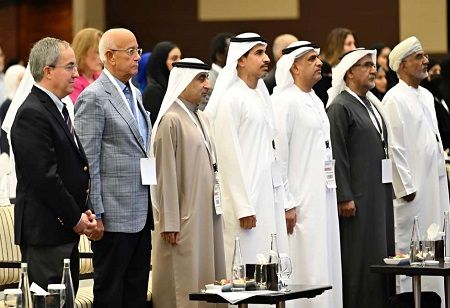- UAE hosts 2025 Medical Education Conference in Abu Dhabi with 600+ global healthcare leaders.
- Event features 20 expert speakers, 10 workshops, and 43 research presentations on training & innovation.
- Focus on AI in medical education, academic accreditation, and boosting UAE's role as a regional training hub.
The Emirati Conference on Medical Education 2025 commenced in Abu Dhabi, hosted by the National Institute for Health Specialties, along with healthcare training agencies and institutions. The conference is attended by more than 600 stakeholders of the healthcare industry.
The ceremony's opening was graced by top officials from different national healthcare organizations, alongside guests from the Accreditation Council for Graduate Medical Education (ACGME-I), the Arab Board of Health Specialisations, and the Saudi Commission for Health Specialties.
As part of continued efforts to improve medical education and professional development, the conference offers a specialized scientific forum to address the latest developments in medical education, share knowledge among professionals, and promote research and innovation in this critical area.
The conference includes the presence of highly esteemed members of the specialized committees of the National Institute for Health Specialties, program directors, faculty, trainees, and healthcare institution leaders.
The agenda of the conference comprises four main sessions and panel discussions with 20 eminent speakers delivering key findings in medical education. Furthermore, 10 specialist workshops are organized to develop skills and facilitate best practices in specialty training and assessment.
Additionally, the conference features 43 research papers, delivered through oral presentations and scientific posters, enabling participants to access latest research and practice in the healthcare profession.
Dr. Mohammed Al-Houqani, Secretary-General at the National Institute for Health Specialties, highlighted that the conference mirrors the institute's vision to enhance medical education in the nation through the development of curricula, enhancement of assessment systems, and the promotion of regional and international alliances. These activities will serve to boost national capabilities in a number of medical specialties.
He further added that the conference has in-depth discussions on artificial intelligence's role in medical education, emphasizing the newest technological use in medical training, evaluation, and clinical skill development. The conference also draws attention to the relevance of academic accreditation and quality assurance to guarantee maximum quality in residency and fellowship programmes.
Dr. Al-Houqani also added that the UAE Medical Education Conference has become an elite forum for knowledge sharing, scientific studies, and innovation in training programs, which has helped to develop medical education and healthcare systems in the UAE and the region.
He stated that this event reinforces the UAE as a regional center for excellence in medical education and healthcare training. He wished that the conference would succeed in its aims by creating an environment of supportive education for medical professionals and sharing best practices to help deliver the best standards of healthcare.

